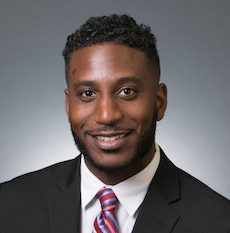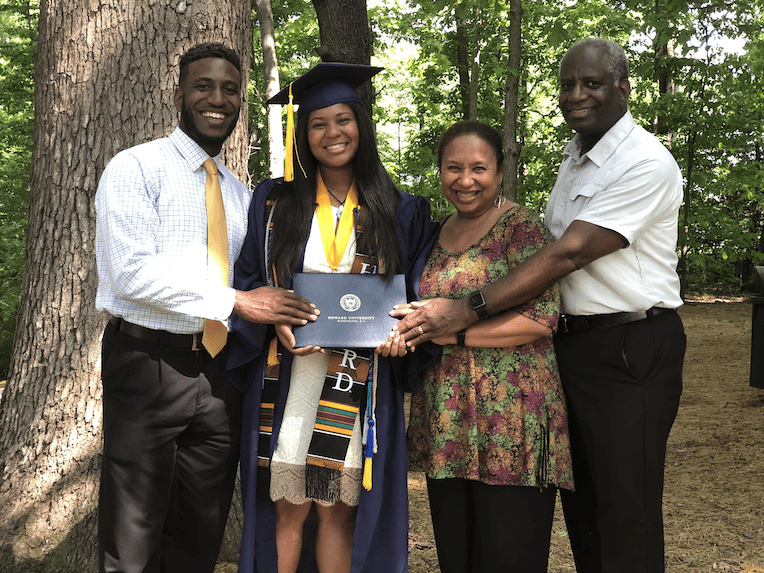
Merrick Robinson Osborne is the first postdoctoral scholar hired in a new Berkeley Haas program focused on racial equity in business. Osborne, who grew up in Portland, Ore., studies how organizations address (or don’t address) prejudice at work and how that impacts social hierarchy.
The new role was created through a $1 million gift from Allan Holt, MBA 76, in support of Diversity, Equity, Inclusion, and Belonging (DEIB) efforts at Haas, which include building a pipeline for new faculty who have a commitment to racial equity in business.
As a postdoctoral scholar, Osborne will research new ideas, collaborate with Haas faculty, and advise doctoral students. He received a BA in psychology from the University of North Carolina at Chapel Hill before earning a PhD at the University of Southern California’s Marshall School of Business in 2022.
Osborne recently discussed how his family influences his work, his research findings, and his future teaching plans with Haas News.
Who are some researchers who inspired you?
At the beginning of my PhD program, I was fascinated by a lot of the work by Haas Professors Cameron Anderson and Jenny Chatman, and I’m still very interested in their work. But I also hold interest in how other fields of study speak to the work that I want to do. Recently I read Audre Lorde’s book Sister Outsider, which was provocative because it spoke to the way I’ve been seeing diversity efforts develop. She says that “Black and third-world people are expected to educate white people about our humanity. Women are expected to educate men. Lesbians and gay men are expected to educate the heterosexual world. The oppressors maintain their position and evade responsibility for their own actions”. I wanted to represent this in my field because I think it has a very practical application.
How do you see it applying?
There are a lot of social hierarchy-related questions in her book. How do white people see people of color explaining racism? How do these conversations that Audre Lorde describes lead to conflict? And how did that impact her status and power? I’m starting to see more intersections with my work outside of my own field, which is really exciting.
Your mom is an experienced social worker and therapist. Has she sparked any research ideas?
My mom, dad, and sister have all touched my research in different ways. My mom’s job as a licensed clinical social worker, and experienced therapist, is to dive under the surface and ask more about what her clients are experiencing. Part of what I want to do is understand the assumptions that we hold about the way our world operates and the way people operate together in the world. But I also want to challenge those assumptions. In talking with my mom, I get a sense for how I can start asking questions.

My dad had a career in corporate America, where he was the first and only person of color. While rising to an executive position, he had to navigate a lot of issues that play out in the work that I am doing. He’ll say,”Oh, that actually relates to this experience that I had or that relates to something that I saw somebody else doing.” An important question is how to make the workplace a better place, especially for people who experience it as a dangerous place, or at least a mildly unsafe place.
An important question is how to make the workplace a better place, especially for people who experience it as a dangerous place, or at least a mildly unsafe place.
My sister’s interests have also shaped my research. She graduated from Howard University, an HBCU, before coming home to work in Portland. Very white spaces are not completely alien to either of us, and I think she has been comfortable moving back. But within that comfort, she does experience some discomfort. And a lot of discomfort that we share comes with being asked to do diversity work at work. Talking to her about her experiences has helped inspire and motivate me to develop research that speaks to her experiences, because I know she is not alone in having them.
What did you focus on during your PhD program?
My dissertation was on confronting prejudice at work, and what happens to a disadvantaged group member who witnesses an advantaged group member confront prejudice and then asks for that person’s input. There’s a lot of depth to it. For example, two men and a woman are in a room. One of the men says something problematic and sexist. The other man speaks up, but then asks for the woman’s input on what she experienced. I was curious about how one disadvantaged group member views these confrontations—when a man speaks up before the woman even has a chance to—and how that woman feels about being drawn into these spaces involuntarily.
At a broader level, when there is a display of prejudice at work, people look for insight about how to address that display effectively and increase inclusion. And oftentimes, they don’t know whom to turn to so they turn to people who they think are best suited for addressing prejudice, which are usually the people who are directly impacted by the prejudice display. I think that can be good, and that can be bad. It’s just important for us to really dissect what happens to the people whose input is sought, and the outcomes they experience.
What will you be working on at Haas in 2023?
A lot of my work now for the next month or two is going to be finishing up my work from USC. I do want to explore more with the folks here on how disadvantaged group members view diversity efforts more broadly. I’m excited to do that through avenues like the Culture Center that Jenny Chatman co-directs, but also through the research and teaching of Drew Jacoby-Senghor and Sa-kiera Hudson, who co-teach the new core course called Business Communication in Diverse Work Environments. I think it’s really important and nice to see the work that’s being done here up close and in person.
How do you feel about racial equity efforts at Haas, compared to other academic environments you’ve experienced?
Something I realized a couple of years ago is that the onus is on academia to make it clear that these are spaces where it’s safe for a marginalized person to operate in. What’s becoming increasingly challenging is learning how to signal that effectively. Part of what I hope for as a postdoc is that I can be a Black man who experiences success here. I want to show other people of color and marginalized people that they can come here and experience success and signal that to other schools too.
Something I realized a couple of years ago is that the onus is on academia to make it clear that these are spaces where it’s safe for a marginalized person to operate in.
Do you plan to teach?
I did an introduction to organizational behavior class for undergrads at USC. I enjoyed it, but I realized that I just wasn’t excited about it in the way that I wanted to be. That was in very large part because I felt like I wasn’t talking about things that really interested me. The MBA classes here include some really stimulating material both for the students and the professors who teach it. So I’m hoping that if I work hard enough, I can put myself in a position next year to teach.